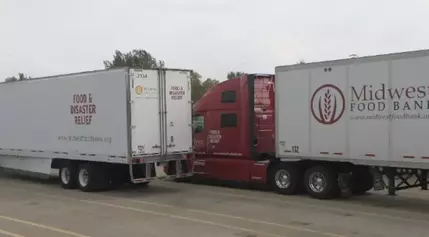News

The Midwest Food Bank is on the verge of a significant boost as it announces a remarkable 0,000 donation from The Church of Jesus Christ of Latter-day Saints Humanitarian Services. This generous contribution is set to have a profound impact on the food bank's operations and its ability to serve those in need.
"Transforming Lives through Food Donations"
Impact on Food Procurement Resources
This substantial donation will provide essential food procurement resources, enabling the Midwest Food Bank to acquire a new delivery truck. With this new vehicle, the food bank's capacity to transport and distribute donated food will expand significantly. It means that more food can reach those who are facing food insecurity, ensuring that essential sustenance reaches families across the Midwest. 1: The acquisition of a new delivery truck is a game-changer for the Midwest Food Bank. It will streamline the transportation process, allowing for quicker and more efficient deliveries. This, in turn, will lead to a reduction in food waste and an increase in the amount of food that reaches those in need. The new truck will be a valuable asset in the food bank's efforts to combat hunger and improve lives. 2: In addition to the new truck, the funds from the donation will also be used to enhance food procurement. This will enable the food bank to source a wider variety of nutritious foods, ensuring that the families it serves receive a balanced diet. By investing in food procurement, the Midwest Food Bank is taking a proactive approach to addressing food insecurity and improving the well-being of communities.Recognition of Outstanding Work
The 0,000 donation comes at a time when the food bank is already receiving recognition for its outstanding work. Kirt L. Hodges, who oversees Latter-day Saints administration in Illinois and Iowa, commended the Midwest Food Bank for its tremendous efforts in improving lives across the country. This recognition highlights the importance of the food bank's work and the impact it has on communities. 1: The partnership between the Midwest Food Bank and The Church of Jesus Christ of Latter-day Saints Humanitarian Services is a powerful one. It demonstrates the commitment of both organizations to working together to address social issues and make a positive difference in people's lives. The donation is a tangible expression of this commitment and a recognition of the Midwest Food Bank's exceptional work. 2: The recognition received by the Midwest Food Bank serves as an inspiration to continue its mission. It shows that the efforts of the food bank are making a real impact and that there is a need for organizations like it to continue their work. With the support of donors like The Church of Jesus Christ of Latter-day Saints, the Midwest Food Bank can continue to expand its reach and make a greater difference in the lives of those in need.Meeting Unprecedented Demand
As the food bank sees unprecedented demand, with over 2,400 partner nonprofits reporting a 25% rise in families seeking food assistance, the donation could not have come at a better time. The funds will directly enhance the food distribution operations, allowing the Midwest Food Bank to reach even more families facing food insecurity. 1: The increase in demand for food assistance is a clear indication of the challenges faced by many families in the Midwest. With the help of this donation, the Midwest Food Bank is well-positioned to meet this demand and provide much-needed support to those in need. The funds will enable the food bank to increase its distribution efforts and ensure that more families have access to nutritious food. 2: The partnership between the Midwest Food Bank and its partner nonprofits is crucial in addressing food insecurity. With the additional resources from the donation, these nonprofits will be able to provide even more support to families in their communities. Together, they are working towards a common goal of alleviating hunger and improving the lives of those affected by food insecurity.




















